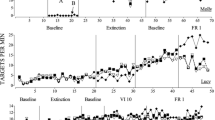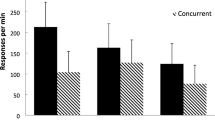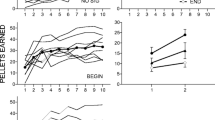Abstract
Undergraduates pressed computer keys to move a cursor through a visual matrix under a multiple fixed ratio 18/differential-reinforcement-of-low-rate 6-s schedule. In Experiment 1, instructions to “Go Fast” or “Go Slow” produced schedule¬insensitive performances for the majority of participants. Subsequent manipulations designed to increase reinforcer magnitude and to place social contingencies on effective cursor movement failed to undermine instructed insensitivity. Such instructed insensitivity may be caused by operant blocking, that is, response-rate instructions prevented acquisition of control by stimulus features associated with the reinforcement schedule. In Experiment 2, participants showing original compliance with response-rate instructions were exposed to the schedule contingencies without instructions. Participants thus exposed to both reinforcer points and schedule-discriminative stimuli were unlikely to show insensitivity upon reintroduction of the instructions, consistent with an operant blocking interpretation of insensitivity. The importance of examining instructional effects in terms of basic principles of stimulus control was emphasized.
Similar content being viewed by others
References
BARRETT, D. H., DEITZ, S. M., GAYDOS, G. R., & QUINN, P. C. (1987). The effects of programmed contingencies and social conditions on response stereotypy with human subjects. The Psychological Record. 37, 489–505.
BUSKIST, W. F., & MILLER, H. L., Jr. (1986). Interaction between rules and contingencies in the control of human fixed-interval performance. The Psychological Record. 36, 109–116.
CATANIA, A. C. (Ed). (1968). Contemporary research in operant behavior. Glenview, Il: Scott, Foresman & Co.
CERUTTI, D. T. (1989). Discrimination theory of rule-governed behavior. Journal of the Experimental Analysis of Behavior. 51, 259–276.
CERUTTI, D. T. (1991). Discriminative versus reinforcing properties of schedules as determinants of schedule insensitivity in humans. The Psychological Record. 41, 51–67.
CERUTTI, D. T. (1994). Compliance with instructions: Effects of randomness in scheduling and monitoring. The Psychological Record. 44, 259–269.
CRUSE, D. B., VITULLI, W., & DERTKE, M. (1966). Discriminative and reinforcing properties of two types of food pellets. Journal of the Experimental Analysis of Behavior. 9, 293–303.
DEGRANDPRE, R. J., & BUSKIST, W. F. (1991). Effects of accuracy of instructions on human behavior: Correspondence with reinforcement contingencies matters. The Psychological Record. 41, 371–384.
DIXON, M. R., & HAYES, L. J. (1998). Effects of differing instructional histories on the resurgence of rule-following. The Psychological Record. 48, 275–292.
GALIZIO, M. (1979). Contingency-shaped and rule-governed behavior: Instructional control of human loss avoidance. Journal of the Experimental Analysis of Behavior. 31, 53–70.
HAYES, S. C., BROWNSTEIN, A. J., ZETTLE, R. D., ROSENFARB, I., & KORN, Z. (1986). Rule-governed behavior and sensitivity to changing consequences of responding. Journal of the Experimental Analysis of Behavior. 45, 237–256.
JOYCE, J. H., & CHASE, P. N. (1990). Effects of response variability on the sensitivity of rule-governed behavior. Journal of the Experimental Analysis of Behavior. 54, 251–262.
LEFRANCOIS, J. R., CHASE, P. N., & JOYCE, J. H. (1988). The effects of a variety of instructions on human fixed-interval performance. Journal of the Experimental Analysis of Behavior. 49, 383–393.
MALOTT, R. W. (1989). The achievement of evasive goals: Control by rules describing contingencies that are not direct acting. In S. C. Hayes (Ed.), Rule-governed behavior: Cognition, contingencies, and instructional control (pp. 269–322. New York: Plenum Press.
MATTHEWS, B. A., SHIMOFF, E., CATANIA, A. C., & SAGVOLDEN, T. (1977). Uninstructed human responding: Sensitivity to ratio and interval contingencies. Journal of the Experimental Analysis of Behavior. 27, 453–467.
NEWMAN, B., BUFFINGTON, D. M., & HEMMES, N. S. (1995). The effects of schedules of reinforcement on instruction following. The Psychological Record. 45, 463–476.
REID, R. L. (1958). The role of the reinforcer as a stimulus. British Journal of Psychology. 49, 202–209.
ROSENFARB, I. S., NEWLAND, C., BRANNON, S. E., & HOWEY, D. S. (1992). Effects of self-generated rules on the development of schedule-controlled behavior. Journal of the Experimental Analysis of Behavior. 58, 107–121.
SCHWARTZ, B. (1982). Reinforcement induced stereotypy: How not to teach people to discover rules. Journal of Experimental Psychology: General, 111, 23–59.
SHIMOFF, E., CATANIA, A. C., & MATTHEWS, B. A. (1981). Uninstructed human responding: Sensitivity of low-rate performance to schedule contingencies. Journal of the Experimental Analysis of Behavior. 36, 207–220.
SKINNER, B. F. (1966). An operant analysis of problem-solving. In B. Kleinmuntz (Ed.), Problem solving: Research, method, and theory (pp. 225–257. New York: Wiley.
VOM SAAL, W., & JENKINS, H. M. (1970). Blocking the development of stimulus control. Learning and Motivation. 1, 52–64.
VYSE, S. A. (1991). Behavioral variability and rule generation: General, restricted, and superstitious contingency statements. The Psychological Record. 41, 487–506.
ZETTLE, R. D., & HAYES, S. C. (1982). Rule-governed behavior: A potential theoretical framework for cognitive-behavioral research and therapy. In P. C. Kendall (Ed.), Advances in cognitive behavioral research and therapy (Vol. 1, pp. 73–118. New York: Academic Press.
Author information
Authors and Affiliations
Additional information
We thank Don Godfred and Rob Zak for their time and effort in creating and improving the computer programs.
Rights and permissions
About this article
Cite this article
Otto, T.L., Torgrud, L.J. & Holborn, S.W. An Operant Blocking Interpretation of Instructed Insensitivity to Schedule Contingencies. Psychol Rec 49, 663–684 (1999). https://doi.org/10.1007/BF03395334
Published:
Issue Date:
DOI: https://doi.org/10.1007/BF03395334




